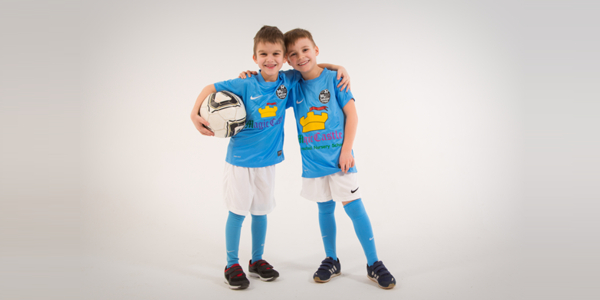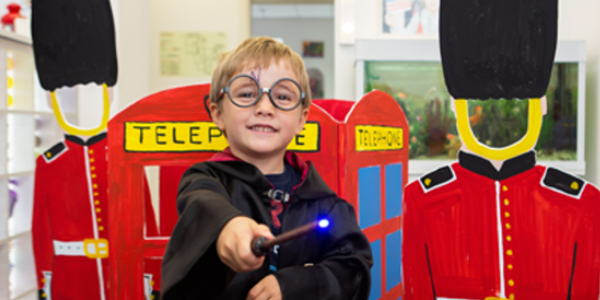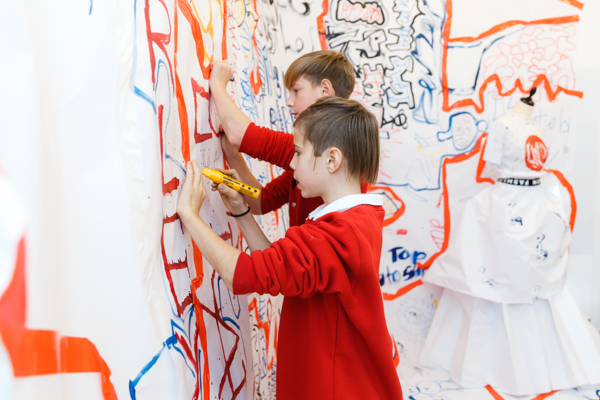Here we have collected our experience in the upbringing and education of children, so that parents have the opportunity to receive the most relevant and important information about the upbringing and education of children and teenagers.
How to communicate with a teenager? Which universities are right for my child? How to write an essay? What is emotional intelligence? You can find these and many other acticles about aspects of raising and educating children on this page.
A-levels! And why does one need it?
Many people dream about education abroad for their kids. An image of gothic libraries and castles of Great Britain is rather appealing and intriguing. Of course, British diploma would hardly help you rocket into the sky on a broom as in Hogwartz but you can for sure skyrocket career wise.
On this excitement wave you go to the Internet and… tons of information with unknown abbreviation start to fall on you like GCSE, AS Level, A level, CAE, UCAS and many more. And the more you search for information on those the more you get sucked into the depth of the internet.

British School
Children in the Great Britain start their education at the age of 4 (Reception Class), so they study up to Year 13. After Year 11 (Grade 9 in Russia) kids pass GCSE exams (General Certification of Secondary Education).
GCSE is a certificate that proves your successful graduation from the middle school. Starting at this point one can continue in Hight School or choose to start working. Moreover, good GCSE is rather crucial for University enrolment since the call for papers starts before final A-levels exams. Also, it’s a great preparation for the high school (Six Form, which is 10th and 11th grades in Russia or age of 16-18).
Two last years of school are devoted to the A-levels preparation. Students choose 4 or 3 subjects to master that they need for the university enrolment. System of grades is from A* (the highest) to E. Also, some of the universities accept AS Exams which are equivalent to one year of A-levels. In case foreign enrollee doesn’t gave A-levels they have to cover Foundation course before entering the university.
In case you want to apply to any university in Great Britain you must upload your documents onto UCAS system – Universities and Colleges Admissions System. It’s allowed to enroll only to 5 universities and upload only 1 motivational letter, so before applying a person should know what is his major since it’s impossible to have motivational letter for different subjects at the same time.
In case a student already knows which university he wishes to go but doesn’t know which faculty to choose there is an option to pass A-levels for preferred subjects which are posted on the website of educational organization. That might give you some extra time to decide.
On top of that UCAS helps to find an appropriate student as well based on the profiles of universities and colleges.
Higher education in Great Britain
So what universities can you choose?
World famous Oxford and Cambridge share the first place. But you cannot enroll at both at the same time. According to the international ratings Oxford is a little bit higher and it’s harder to get there than to Cambridge. Successful enrollment to Oxford is about 17%, while it’s around 24% for Cambridge according to the 2019 survey.
Oxford University is a place that needs no introduction. This place is covered with history and unusual atmosphere could be sensed in every building. No wonder many famous Harry Potter panoramas were shot in here.
Oxford consists of 38 colleges and each of them uses multidisciplinary approach, so a student of one academic department can attend lectures from another. All of them are structured in big four groups: humanities, social studies, natural and exact science and math.

Cambridge University consists of 31 colleges (the most renown Trinity College, St. John’s College). Cambridge is one of the most conservative Universities (students cannot enter some cafes without uniform: mantel and corner cap). Cambridge has given 88 Nobel prize winners to the world.
At the same time Great Britain is rich with other wonderful universities.
King’s College of London (KCL or King’s) is one of the oldest universities which was established in 1829. It provides wide variety of schools and fields of study. The most popular is St. Thomas College. Second by popularity is School of Law and School of History. Among famous graduates are Virginia Woolf, Somerset Maugham, a variety of politicians and scientists (12 Nobel prize winners, that took a huge part in DNA reveal, Higgs boson and etc.).

London School of Economics (LSE) has rather narrowed filed od study as it follows from its name. It was established by leaders of Fabian movement as an opposition to the imperium views. The strongest department is for political studies and public administration (these departments are the strongest in Europe). Moreover, programs for public relations, development economics and business governing are outstanding as well. LSE is in possession of the vastest library for humanities in all European languages. Among famous graduates are J.F. Kennedy, Friedrich Hayek, David Rockefeller, Mick Jagger and others.
University College of London (UCL) grew out of chemistry department and couple of foreign languages department. As of today UCL provides one of the most profound education in precise sciences.
King’s College, London School of Economics and University College of London create together with Oxford and Cambridge a “Golden Triangle” of the British education.
The UK offers high-end education not only in sciences but in creative sphere as well.
For example, if you are interested in career connected to the world of fashion, design and art University of Arts of London is the place for you. It’s one of the most famous Universities in the world. It includes world known London College of Fashion and Central Saint Martins. Paris and Milan are without a doubt leader of runway shows, but the fashion technologies and new patterns are designed in London. Famous graduates are Stella Mccartney, Alexander McQueen, John Galliano, 8 Oscar winners and Turner Prize.

All of those universities are included into Russell Group (24 leading universities of the UK) famous as Ivy League is the USA. To find information and compare universities of Great Britain one can visit discoveruni.gov.uk.
A-levels not only in England
If you are not too excited about weather in the Albion, a lot of other options are opened before you. Many countries such as Spain, Germany, Singapore, Egypt, Canada, Australia, New Zealand accept A-levels. A potential student should keep in mind that usually math A-levels is obligatory in these countries regardless of the field of study. There are more than 80 universities in USA that accept A-levels, but with different credit score, in some of them you will have to pass additional exams.
So, as you may see if a applicant has A-levels boarders vanish as if by a magic wand command. Applicantus!
How To Write An Essay?
When you are enrolling at various programs or universities one of the major tasks is to write an essay. But not many know that this form of written self-expression has its rules and types.
“Please, write 1000 words essay on indicated topic” – this phrase often scares students. What is it to write about? What should be the beginning? Is 900 words ok? Meanwhile, knowing rules of an essay will save you a lot of time and troubles.

Types of essays are different, but analytical type is needed for application. An author sets a question and brings different arguments to answer it. However, if you are aimed at certain university or company better to follow their requirements. For example, Harvard limits size of a needed essay to 2 pages maximum, while Russian universities allow 5 or even 10 pages. Foreign universities have certain expectations from essays.
Essay Writing Advice
Firstly, you need to make a question and mark your view on the issue and then suggest arguments. While in Russian approach it’s more common to make rather voluminous introduction. The first part may be based on the three following items:
– what is this text about (In this essay I shall consider the question of …)
– which materials, positions, experience will be used (I intend to focus on…)
– which arguments author will try to prove (I will suggest that…).
Secondly, in case you are righting big essay it’s good to have a plan. Indicate short statements that you would like to prove or refute in your work. One paragraph usually equals one argument. Also don’t forget that paragraphs should be well defined due to the essay structure. Usually, argument part takes around 60% of the whole work. It’s good to say not only why you agree with this point of view but also why other opinions might be false.
Sentences and paragraphs should be coherent with each other. Sometimes student uses connecting words or even the whole sequence of sentences that are connected. But one should be careful about quantity of opening phrases not to overload text with meaningless part.
Examples of connecting words:
1. Moreover
2. Furthermore
3. Not only x but also y
4. Considering…
5. The fact that…
6. On the subject of…
7. In the same way/fashion
8. Regardless of the mentioned above
Fourthly, it’s important to check your information, better to put links to sources. Argument looks always more credible if it is backed up by research, examples and/or statistics. Moreover, choose sources carefully not every website or author provide trustworthy information.
Conclusion should sum up your ideas. Perhaps, you can remind your idea from the introduction. Reader could be grateful to you for short retell of the main points.
Slang is not acceptable, and a text should be different and pleasant to read. Here are some examples of words variations:
| Instead of “I think” | Instead of “difficult” | Instead of “issue” |
|
I assume |
Tough |
Subject |
|
In my opinion |
Problematic |
Matter |
|
As far as I can tell |
Demanding |
Affair |
|
I consider |
Uphill |
Concern |
|
It seems to me that |
Laborious |
Business |
|
The way I see things is that |
Onerous |
Predicament |
There is a universal rule in terms of word count – it’s allowed to change number of words for 10% in both directions. Statistically, in case someone writes less words by 20% it’s not enough to open the topic sufficiently. Exсess words could lead to overwhelming of the text.
For more detailed advice you can refer to websites of universities/colleges/schools. For example, here you can look at Oxford demands.
And the main rule you should always read your work twice before submitting. In case you have time take a break and take a look at your work a bit later.
10 Reasons to Enroll Your Child at British School
No matter how our world changes the issue of education is always one of the crucial ones. Among big variety of options foreign education is among the most desirable options. And British education is specifically on top due to historical images and ratings of universities and schools of the Great Britain.

Advantages of the British School
1. Firstly, multiple research prove the positive effect of bilingualism for a human’s brain. Impact is especially noticeable in early childhood and in older years. Kids that are growing in multilingual atmosphere show more rapid development, higher level of attention and logic. On top “cognitive reserve” is notably higher among such people.
English is International Language
2. Secondly, English language holds a title of international language for rather long time. In case a person is fluent he will feel comfortable all around the world. Besides career perspectives get new angels and not only abroad but in Russia as well. Many big corporates have their subsidiaries here.
3. Thirdly, British school gives an opportunity to get to know different culture and behavioral environment. This allows a person to be open, feel less stress and widen social circle.
School for a Career
4. British education opens doors of many foreign Universities. A student can save one year and doesn’t have to master Foundation Year that is necessary to have for foreign students. And not only England accepts those exams but also many world Universities.
Extra Classes for the Kids
5. British education pays a lot of attention to the extra curriculum and personal development. Aside from main academic part schedule is filled with sport, art, music classes. It’s highly important to raise versatile personality. Pupils tried themselves in all those directions at least once.

6. When a child approaches high school (10th and 11th grades according to Russian system and Year 12 and Year 13 in British system) he devotes all of his time to 3 or 4 main subjects needed for university enrollment. They spend their time on things that are truly important.
7. British schools as well as Universities it’s not only education but future social circle as well. Rather often people educated at one place have a lot in common as open view at the world, possibility to work in teams, and forms future professional environment.
British Education Abroad
8. Of special note is continuity of the education. National Curriculum for England has common standards worldwide and starts at 4 years age. If school is licensed to test for A-levels exams you can be sure of high level of education. Moreover, in times of high international mobility if you move somewhere you can be sure that your child will be comfortable in a foreign school.
9. British schools pay great attention to practical and solo work. Many lessons are held in a form of dialogue and active work with students. The latter receive presentation skills, well-founded discussion and skill to prove one’s point of view. Special role is given to the information search. During the technology era it’s crucial to know how to find credible information sources.
Private School

10. British schools in Russia are private schools. It gives students individual approach and closer control from parents’ side. Small classes allow to diversify tasks by levels of difficulty depending on a child. This allows to improve knowledge as well as get to another level.
No matter which school you choose it is always important to talk and hear your child’s needs. School is a place for new knowledge and curiosity but not for rote learning and boring lectures.
Fear Sees Danger Everywhere
“Mom, there are monsters under my bed”. “I don’t want to go there”. “Parents were fighting so they will divorce”. Rather often kids face such fears and some other so-called irrational fears. The reasons for such fears could change depending on the age but the feeling itself is pretty much the same. So how can we help kids with this?

Why a child is scared?
Firstly, let’s try to figure out what is fear and why do we need it. It forms with one of the oldest parts of the brain – amygdala. This bank of emotions contains both positive (happiness, astonishment, interest) and negative emotions (sadness, anger, disgust). The seven emotion is fear which could be hardly identified to one of those groups. It can be pleasant as well as not so much (there is a reason why many people enjoy horror movies, fear brings with it other positive emotions that are tightly interconnected in amygdala).
Fear could be a response to the existing memories as well as fear of unknown. It’s an instinct built into humans in order to survive. When a person is scared his body produces a strong cocktail of hormones and chemical neurotransmitters, that make a human stronger, faster and more attentive.
Children fears are common to many because before gaining experience and knowledge about the world, many things seem big and unfamiliar.
How to help a child to overcome his fears
Don’t diminish kids’ fears. It’s not so evident to a child that there can’t be any monsters under the bed. The better way in this situation is to stay with a child, promise to stay by his side until he is asleep. You can suggest leaving a night light. By the way the discomfort because of the darkness is our genetic history. Homo Sapiens evolved from day-living primates and selection preserved only those genes that could be attentive during the nighttime not to get eaten.
Act out scary situation with a child. Choose a scenario that includes kids’ fears and possible ways to resolve them. Children often leave through their troubles using associative images. It’s helpful to use toys, drawings, plasticine.
Ask a child to draw his fears and then add some funny or preposterous features to it together. A monster with tusks is not so scary when has allergies and teary eyes when covered with napkins.

The best example is your own. Don’t hide your moments of fear. On the other hand, show your child how one can overcome his fears and unpleasant emotions. At the same time in case an adult can’t cope with his own fears and is being scared of every leaf, his anxiety will be passed to a kid.
Relations with fear can be practiced. That’s why controlled stress situations are useful. But don’t forget that you should act gradually. If a child is scared of dogs, you should bring it home as a pet right away. At first try to look at pictures and videos, discuss how to understand by the look of the dog if it is angry or happy. You can agree with your acquaintances with a dog to wave them from a far and only after that try to come up.
Relaxation. Often when we are scared our muscles flex and we will tense in different parts of our body. Try to bring child’s attention to these places and breath and relax.
Fears change with age. For example, teenagers might feel anxiety when they hear their parents fight. It’s very important to give an idea that conflicts are part of any relationships. And despite emotional behavior parents can find common grounds. To hide occasional fights is to lead to unhealthy image of kid’s future relations. Kids who never saw their parents fight later in adult life might think that quarrel is a sign of unhealthy relations.
Guardian toy. Appoint any toy to be a guardian, that will be always by his side. It can be anything (flashlight, teddy bear, little toy car, etc.)
If feel of anxiety does not go away and a child is constantly suffering from stress you should consider talking to children’s psychologist.
In any case successful resolving of children’s fears is strongly dependent on parents’ readiness to communicate and hear out.
Contemporary teacher: who is he?
During the last 10 years pace of the economic development slowed down while changes in the society and human relations showed drastic change. Access to the high-end educational services becomes not less important than financial possibilities. Institute of school has changes as well. And as a result, core values for teacher’s job changed too.

How to define a fact from fake?
Lectures as an educational format is becoming less desirable. In the Internet age a teacher is no longer an owner of exclusive information, but his experience and abilities are more of demand. One of the most important goals for the teacher is to show how to work with information, how to work with credible sources. For example, why information from the Forbes website is more highly valued than information from a boulevard paper.
Games during the lessons
It’s undoubtful that ability of a teacher to know how to get his audience interested in the subject is one of the main conditions of successful education. Modern kids live in the times of a very intense content. So, a mentor will hardly manage to keep attention of his students without games, unexpected tasks or solving problems that are close to the real life (figure out interest rate for your loan, invest in Tesla papers or find out blood type of your brother).
Can you ask questions during the lesson?
It’s important for the sake of education to have a dialog and pose native questions. Information in a form of lecture will fall into the dark depth of memory approximately after 10 minutes. At the same time questions, analogies, suggested by the students will help to create secure neuro net of knowledge that could be easily retracted. Moreover, a feeling of engagement and some control over the lesson course will bring incredible motivation for the students.

Modern Kids Interests
It’s quite important for a teacher to be aware of the ongoing hobbies and trends among kids. Even if he doesn’t share them. Sometimes brain freeze in front of classical literature is more understandable if you know the difference of relationships today comparing to the XIX century. For example, usage of a well-known popular subject like simple dimple might easy the process of business model explanation.
Teacher’s Education
Knowledge is always renewed during career time in any field. There are always new technologies, approaches, ideas and research. A biology teacher is more credible if he uses new discoveries in his work. Foreign languages knowledge is rather crucial for this case. It opens access to the world research community. Participation in conferences on regular basis gives constant update to teacher’s techniques of information delivery and interaction with students.
Emotional Intelligence
There is a stereotype of a teacher whose lessons are visited by most students because he is strict. At the same time level of engagement and interest during the lesson is low since a teacher is distant and doesn’t pay much attention to the communication with the children. In case pupils see that teacher can acknowledge his mistakes and can laugh at bizarre situations they are more likely to ask questions during the lesson and be open. Let’s not forget about burnout at work. An experienced teacher will note the first signs of it and prevent. He will be able to come back to the class with fresh ideas and positive attitude.
Conflicts at School
In times of conflict a teacher shouldn’t shy away from being a facilitator between kids. Despite open approach a teacher still preserves certain level of authority being an adult in the room. A person shouldn’t rely resolving of these questions solely onto psychologist since a teacher is basically in forefront of the conflict and can stop developing of the tension or give a clear picture to the psychologist if needed.

Innovation at School
Modern kids face technology rater early. Now it’s hard to say with certainty if it’s only good or bad, but it’s remains a fact. One can remember long fights about usage of mobile phones or ultrasound, although now we use them on daily basis. So, if school’s goal is to prepare kids for adult life usage of smart boards, programming, online tasks is crucial to succeed. A teacher shouldn’t demonize gadgets. Instead, it’s more productive to show how to work with technology and what good can come out of it.
Choose your MAGIC CASTLE

THE GREAT GATSBY










